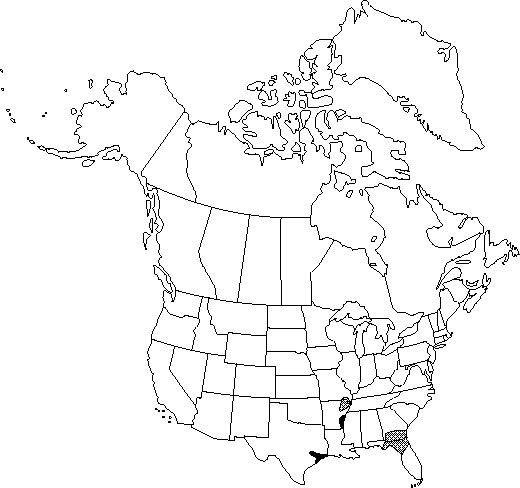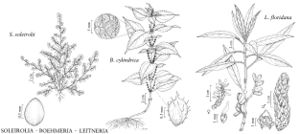FNA>Volume Importer |
imported>Volume Importer |
| (7 intermediate revisions by 2 users not shown) |
| Line 15: |
Line 15: |
| | }}{{Treatment/ID/Special_status | | }}{{Treatment/ID/Special_status |
| | |code=F | | |code=F |
| − | |label=Selected by author to be illustrated | + | |label=Illustrated |
| | }} | | }} |
| | |basionyms= | | |basionyms= |
| Line 21: |
Line 21: |
| | |name=Myrica floridana | | |name=Myrica floridana |
| | |authority=(Chapman) A. W. Wood | | |authority=(Chapman) A. W. Wood |
| | + | |rank=species |
| | }} | | }} |
| | |hierarchy=Leitneriaceae;Leitneria;Leitneria floridana | | |hierarchy=Leitneriaceae;Leitneria;Leitneria floridana |
| Line 29: |
Line 30: |
| | }}<!-- | | }}<!-- |
| | | | |
| − | --><span class="statement" id="st-d0_s0" data-properties="shrub atypical some measurement;shrub some measurement;shrub diameter;tree size;tree atypical some measurement;tree some measurement;tree diameter"><b>Shrubs </b>or small trees, 1-4 (-8) m, to 15 cm diam. at base.</span> <span class="statement" id="st-d0_s1" data-properties="stem architecture;stem architecture;stem size;stem pubescence;stem pubescence"><b>Stems </b>unbranched or sparsely short-branched distally, slender, pubescent, becoming glabrous.</span> <span class="statement" id="st-d0_s2" data-properties="bark coloration;bark coloration;bark coloration"><b>Bark </b>gray to dark reddish-brown;</span> <span class="statement" id="st-d0_s3" data-properties="lenticel quantity;lenticel coloration">lenticels numerous, gray.</span> <span class="statement" id="st-d0_s4" data-properties="petiole some measurement;petiole pubescence;petiole pubescence"><b>Leaves:</b> petiole 2-7 cm, densely pubescent, becoming ± glabrous.</span> <span class="statement" id="st-d0_s5" data-properties="leaf-blade shape;leaf-blade shape;leaf-blade shape;leaf-blade length;leaf-blade width;leaf-blade texture;base shape;margin shape or vernation;apex shape;apex shape;apex shape"><b>Leaf-</b>blade lanceolate to elliptic-lanceolate, 5-20 × 3.5-6 cm, leathery, base acute, margins narrowly revolute, apex acute to acuminate;</span> <span class="statement" id="st-d0_s6" data-properties="surface pubescence;surface pubescence;surface reflectance">surfaces silky-pubescent when young, becoming glabrous and glossy adaxially.</span> <span class="statement" id="st-d0_s7" data-properties="catkin architecture;catkin shape;catkin architecture or arrangement;catkin course;catkin length;catkin width"><b>Inflorescences:</b> staminate catkins cylindric in bud, lax and outward curving at anthesis, 2-6 × 1-1.5 cm;</span> <span class="statement" id="st-d0_s8" data-properties="inflorescence architecture;inflorescence orientation;inflorescence length;inflorescence width">pistillate stiffly erect, 1-3 × 1 cm.</span> <span class="statement" id="st-d0_s9" data-properties="flower architecture;stamen atypical quantity;stamen atypical quantity;stamen quantity"><b>Staminate </b>flowers: stamens (3-) 10-12 (-15);</span> <span class="statement" id="st-d0_s10" data-properties="flower architecture;filament height or length or size">filaments short;</span> <span class="statement" id="st-d0_s11" data-properties="flower architecture;anther fixation;anther shape;anther architecture or structure in adjective form;anther dehiscence">anthers basifixed, broadly oblong, 4-sporangiate, 2-locular at anthesis, dehiscing longitudinally.</span> <span class="statement" id="st-d0_s12" data-properties="flower architecture;sepal atypical quantity;sepal atypical quantity;sepal quantity;sepal position;sepal size"><b>Pistillate </b>flowers: sepals (3-) 4 (-8), irregularly inserted, unequal;</span> <span class="statement" id="st-d0_s13" data-properties="flower architecture;ovary arrangement or shape;ovary some measurement;ovary pubescence">ovary elliptic, ca. 2 mm, finely pubescent;</span> <span class="statement" id="st-d0_s14" data-properties="flower architecture;style some measurement">style 4-5 mm;</span> <span class="statement" id="st-d0_s15" data-properties="flower architecture;stigma position;stigma orientation;stigma architecture;stigma coloration">stigma exserted, often recurved or twisted, reddish.</span> <span class="statement" id="st-d0_s16" data-properties="drupe orientation;drupe coloration;drupe coloration;drupe shape;drupe shape;drupe shape;drupe shape;drupe pubescence;base shape;apex shape;stylar prominence;stylar coloration;scar prominence;scar coloration;flesh width"><b>Drupes </b>erect, green, becoming chestnut-brown, elliptic to oblongelliptic, often compressed on drying, 1-2.5 cm, glabrous, base and apex blunt, apex with conspicuous dark stylar scar, vascular-bundles toughening the thin flesh;</span> <span class="statement" id="st-d0_s17" data-properties="endocarp coloration;endocarp texture;surface architecture or coloration or relief">endocarp brown, bony, surface rough-reticulate.</span> <span class="statement" id="st-d0_s18" data-properties="seed quantity;seed shape"><b>Seeds </b>1, compressed;</span> <span class="statement" id="st-d0_s19" data-properties="seed-coat texture;hilum coloration;hilum shape">seed-coat membranous, hilum blackish, elongate;</span> <span class="statement" id="st-d0_s20" data-properties="endosperm width;endosperm texture">endosperm thin, starchy;</span> <span class="statement" id="st-d0_s21" data-properties="embryo size;embryo course">embryo large, straight;</span> <span class="statement" id="st-d0_s22" data-properties="">cotyledons ovoid, slightly fleshy.</span> <span class="statement" id="st-d0_s23" data-properties="cotyledon shape;cotyledon texture;2n chromosome quantity">2n = 32.</span><!-- | + | --><span class="statement" id="st-undefined" data-properties=""><b>Shrubs </b>or small trees, 1-4(-8) m, to 15 cm diam. at base. <b>Stems</b> unbranched or sparsely short-branched distally, slender, pubescent, becoming glabrous. <b>Bark</b> gray to dark reddish brown; lenticels numerous, gray. <b>Leaves</b>: petiole 2-7 cm, densely pubescent, becoming ± glabrous. <b>Leaf</b> blade lanceolate to elliptic-lanceolate, 5-20 × 3.5-6 cm, leathery, base acute, margins narrowly revolute, apex acute to acuminate; surfaces silky-pubescent when young, becoming glabrous and glossy adaxially. <b>Inflorescences</b>: staminate catkins cylindric in bud, lax and outward curving at anthesis, 2-6 × 1-1.5 cm; pistillate stiffly erect, 1-3 × 1 cm. <b>Staminate</b> flowers: stamens (3-)10-12(-15); filaments short; anthers basifixed, broadly oblong, 4-sporangiate, 2-locular at anthesis, dehiscing longitudinally. <b>Pistillate</b> flowers: sepals (3-)4(-8), irregularly inserted, unequal; ovary elliptic, ca. 2 mm, finely pubescent; style 4-5 mm; stigma exserted, often recurved or twisted, reddish. <b>Drupes</b> erect, green, becoming chestnut brown, elliptic to oblong-elliptic, often compressed on drying, 1-2.5 cm, glabrous, base and apex blunt, apex with conspicuous dark stylar scar, vascular bundles toughening the thin flesh; endocarp brown, bony, surface rough-reticulate. <b>Seeds</b> 1, compressed; seed coat membranous, hilum blackish, elongate; endosperm thin, starchy; embryo large, straight; cotyledons ovoid, slightly fleshy. <b>2n</b> = 32.</span><!-- |
| | | | |
| | -->{{Treatment/Body | | -->{{Treatment/Body |
| Line 37: |
Line 38: |
| | |distribution=Ark.;Fla.;Ga.;Mo.;Tex. | | |distribution=Ark.;Fla.;Ga.;Mo.;Tex. |
| | |discussion=<p>Of conservation concern.</p><!-- | | |discussion=<p>Of conservation concern.</p><!-- |
| − | --><p>Vegetative reproduction is predominant, forming large clones from adventitious buds on shallow roots. Large, old plants ("small trees") are apparently rare in the field. Florida plants begin growth about a month before Missouri plants (J. W. Day 1975). Leitneria floridana is successfully cultivated as far north as Chicago, Rochester, and Boston.</p><!-- | + | --><p>Vegetative reproduction is predominant, forming large clones from adventitious buds on shallow roots. Large, old plants ("small trees") are apparently rare in the field. Florida plants begin growth about a month before Missouri plants (J. W. Day 1975). <i>Leitneria floridana</i> is successfully cultivated as far north as Chicago, Rochester, and Boston.</p><!-- |
| | --><p>The wood (sp. gr. 0.21) is lighter than cork (sp. gr. 0.24); it is used locally for fishnet floats or bottle stoppers.</p> | | --><p>The wood (sp. gr. 0.21) is lighter than cork (sp. gr. 0.24); it is used locally for fishnet floats or bottle stoppers.</p> |
| | |tables= | | |tables= |
| Line 47: |
Line 48: |
| | -->{{#Taxon: | | -->{{#Taxon: |
| | name=Leitneria floridana | | name=Leitneria floridana |
| − | |author=
| |
| | |authority=Chapman | | |authority=Chapman |
| | |rank=species | | |rank=species |
| Line 61: |
Line 61: |
| | |publication title=Fl. South. U.S., | | |publication title=Fl. South. U.S., |
| | |publication year=1860 | | |publication year=1860 |
| − | |special status=Conservation concern;Endemic;Selected by author to be illustrated | + | |special status=Conservation concern;Endemic;Illustrated |
| − | |source xml=https://jpend@bitbucket.org/aafc-mbb/fna-fine-grained-xml.git/src/287ef3db526bd807d435a3c7423ef2df1e951227/V3/V3_339.xml | + | |source xml=https://bitbucket.org/aafc-mbb/fna-data-curation/src/2e0870ddd59836b60bcf96646a41e87ea5a5943a/coarse_grained_fna_xml/V3/V3_339.xml |
| | |genus=Leitneria | | |genus=Leitneria |
| | |species=Leitneria floridana | | |species=Leitneria floridana |
| − | |2n chromosome quantity=32
| |
| − | |anther architecture or structure in adjective form=2-locular
| |
| − | |anther dehiscence=dehiscing
| |
| − | |anther fixation=basifixed
| |
| − | |anther shape=oblong
| |
| − | |apex shape=blunt;acute;acuminate
| |
| − | |bark coloration=gray;dark reddish-brown
| |
| − | |base shape=blunt;acute
| |
| − | |catkin architecture=staminate
| |
| − | |catkin architecture or arrangement=lax
| |
| − | |catkin course=curving
| |
| − | |catkin length=2cm;6cm
| |
| − | |catkin shape=cylindric
| |
| − | |catkin width=1cm;1.5cm
| |
| − | |cotyledon shape=ovoid
| |
| − | |cotyledon texture=fleshy
| |
| − | |drupe coloration=chestnut-brown;green
| |
| − | |drupe orientation=erect
| |
| − | |drupe pubescence=glabrous
| |
| − | |drupe shape=compressed;elliptic;oblongelliptic
| |
| − | |embryo course=straight
| |
| − | |embryo size=large
| |
| − | |endocarp coloration=brown
| |
| − | |endocarp texture=osseous
| |
| − | |endosperm texture=starchy
| |
| − | |endosperm width=thin
| |
| − | |filament height or length or size=short
| |
| − | |flesh width=thin
| |
| − | |flower architecture=pistillate;pistillate;pistillate;pistillate;staminate;staminate;staminate
| |
| − | |hilum coloration=blackish
| |
| − | |hilum shape=elongate
| |
| − | |inflorescence architecture=pistillate
| |
| − | |inflorescence length=1cm;3cm
| |
| − | |inflorescence orientation=erect
| |
| − | |inflorescence width=1
| |
| − | |leaf-blade length=5cm;20cm
| |
| − | |leaf-blade shape=lanceolate;elliptic-lanceolate
| |
| − | |leaf-blade texture=leathery
| |
| − | |leaf-blade width=3.5cm;6cm
| |
| − | |lenticel coloration=gray
| |
| − | |lenticel quantity=numerous
| |
| − | |margin shape or vernation=revolute
| |
| − | |ovary arrangement or shape=elliptic
| |
| − | |ovary pubescence=pubescent
| |
| − | |ovary some measurement=2
| |
| − | |petiole pubescence=glabrous;pubescent
| |
| − | |petiole some measurement=2cm;7cm
| |
| − | |scar coloration=dark
| |
| − | |scar prominence=conspicuous
| |
| − | |seed quantity=1
| |
| − | |seed shape=compressed
| |
| − | |seed-coat texture=membranous
| |
| − | |sepal atypical quantity=4;8
| |
| − | |sepal position=inserted
| |
| − | |sepal quantity=4
| |
| − | |sepal size=unequal
| |
| − | |shrub atypical some measurement=4m;8m
| |
| − | |shrub diameter=0cm;15cm
| |
| − | |shrub some measurement=1m;4m
| |
| − | |stamen atypical quantity=12;15
| |
| − | |stamen quantity=10;12
| |
| − | |stem architecture=short-branched;unbranched
| |
| − | |stem pubescence=glabrous;pubescent
| |
| − | |stem size=slender
| |
| − | |stigma architecture=twisted
| |
| − | |stigma coloration=reddish
| |
| − | |stigma orientation=recurved
| |
| − | |stigma position=exserted
| |
| − | |stylar coloration=dark
| |
| − | |stylar prominence=conspicuous
| |
| − | |style some measurement=4mm;5mm
| |
| − | |surface architecture or coloration or relief=rough-reticulate
| |
| − | |surface pubescence=glabrous;silky-pubescent
| |
| − | |surface reflectance=glossy
| |
| − | |tree atypical some measurement=4m;8m
| |
| − | |tree diameter=0cm;15cm
| |
| − | |tree size=small
| |
| − | |tree some measurement=1m;4m
| |
| | }}<!-- | | }}<!-- |
| | | | |
| | -->[[Category:Treatment]][[Category:Leitneria]] | | -->[[Category:Treatment]][[Category:Leitneria]] |
Shrubs or small trees, 1-4(-8) m, to 15 cm diam. at base. Stems unbranched or sparsely short-branched distally, slender, pubescent, becoming glabrous. Bark gray to dark reddish brown; lenticels numerous, gray. Leaves: petiole 2-7 cm, densely pubescent, becoming ± glabrous. Leaf blade lanceolate to elliptic-lanceolate, 5-20 × 3.5-6 cm, leathery, base acute, margins narrowly revolute, apex acute to acuminate; surfaces silky-pubescent when young, becoming glabrous and glossy adaxially. Inflorescences: staminate catkins cylindric in bud, lax and outward curving at anthesis, 2-6 × 1-1.5 cm; pistillate stiffly erect, 1-3 × 1 cm. Staminate flowers: stamens (3-)10-12(-15); filaments short; anthers basifixed, broadly oblong, 4-sporangiate, 2-locular at anthesis, dehiscing longitudinally. Pistillate flowers: sepals (3-)4(-8), irregularly inserted, unequal; ovary elliptic, ca. 2 mm, finely pubescent; style 4-5 mm; stigma exserted, often recurved or twisted, reddish. Drupes erect, green, becoming chestnut brown, elliptic to oblong-elliptic, often compressed on drying, 1-2.5 cm, glabrous, base and apex blunt, apex with conspicuous dark stylar scar, vascular bundles toughening the thin flesh; endocarp brown, bony, surface rough-reticulate. Seeds 1, compressed; seed coat membranous, hilum blackish, elongate; endosperm thin, starchy; embryo large, straight; cotyledons ovoid, slightly fleshy. 2n = 32.
Phenology: Flowering late winter–early spring; fruiting spring–summer.
Habitat: Open or forested swamps, wet thickets, roadside ditches, saw-grass-palmetto marshes, estuarine tidal shores
Elevation: 0-100 m
Distribution
Ark., Fla., Ga., Mo., Tex.
Discussion
Of conservation concern.
Vegetative reproduction is predominant, forming large clones from adventitious buds on shallow roots. Large, old plants ("small trees") are apparently rare in the field. Florida plants begin growth about a month before Missouri plants (J. W. Day 1975). Leitneria floridana is successfully cultivated as far north as Chicago, Rochester, and Boston.
The wood (sp. gr. 0.21) is lighter than cork (sp. gr. 0.24); it is used locally for fishnet floats or bottle stoppers.
Selected References
None.

